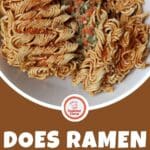Does ramen expire? Yes, eventually it does. While dry ramen noodles and seasoning packets last a long time, exposure to air, humidity, and time will break them down.
Plus, the fats in the flavor packets can go rancid, even if the noodles still look fine. If you’ve stored ramen in an unmarked bag or container, here’s how to check if it’s still safe to eat:
Here’s a checklist to see if your ramen may still be good to eat:
- If the expiration or best-by date has not yet passed, but you see pests or mold, throw away both noodles and flavor packet.
- Check that neither the outer package nor the seasoning/flavor packet have holes or tears; exposure to air affects the freshness and you should dispose of it all.
- Once the expiration date has passed, but both wrappings are intact, examine the noodles first: the dry noodles should have no sign of mold (green, black or pink spots or streaks). If you see signs of mold, throw it all away. (Some noodles have a dusting of white flour to prevent sticking.)
- So far, you don’t see mold, but now you should sniff the noodles; dry noodles won’t have much smell at all. Do they smell yeasty, “off”, sour, or rancid? If so, throw it all away.
- Next, the noodles seem fine, so it’s time to open the broth powder packet. If it’s tough to break apart, if it smells rancid or like paint, or if you can see fuzzy mold spots, throw it all away.
- If everything looks and smells fine, but you make the ramen noodles according to package directions and taste it, but it tastes sour, unpleasant, rancid, or has no flavor at all, drain the broth down the sink and then throw the noodles in the trash.
Tips aside, Vite Ramen and Mike’s Mighty Good say for the best possible ramen experience, do not eat their ramen product after the expiration date.
It’s worth mentioning that the flavor packets or seasonings that come with instant ramen may have a shorter shelf life compared to the noodles themselves. These seasonings often contain oils and other ingredients that can go rancid over time. It’s best to check the expiration date on the flavor packets and discard them if they have expired.

WANT TO SAVE THIS?
The USDA provides information on the shelf life of dried noodles and pasta at 2 years, but the seasoning/broth powder/flavor packet accompanying the dehydrated noodles contains fats that can go rancid and have a shorter shelf life.
Packaged dry ramen typically has a long shelf life, thanks to its dehydrated nature. As long as the packaging remains intact and is stored in a cool, dry place, they can last for several months or even years past their expiration date. However, it’s important to note that the quality and taste of the ramen may deteriorate over time.
It’s worth mentioning that the flavor packets or seasonings that come with packaged ramen may have a shorter shelf life compared to the noodles themselves.
Be sure to check the expiration date on the flavor packets and use the checklist above to determine if it is still safe to eat or discard them if they have expired.

The bottom line
So if you’re wondering if it’s ok to eat ramen noodles after they expire, yes, for a little while, anyway, as long as you carefully check for signs of pests, mold, spoiling, or decay.
Since the broth powder has fats, it can go rancid, so if the package has been left in humid conditions for a long time (on a shelf in the garage, for example), you won’t know it’s not good to eat until you make the soup and taste it.
If the ramen tastes sour, spoiled, like paint or turpentine, rancid, or off in any way, don’t eat anymore of it—drain the broth down the sink and throw the noodles in the trash.








